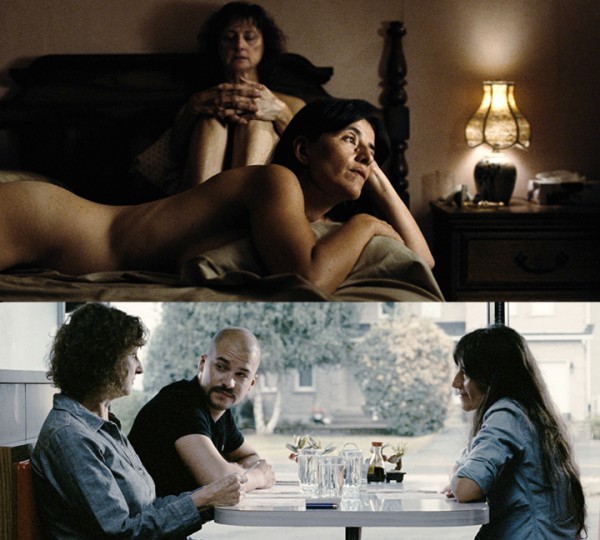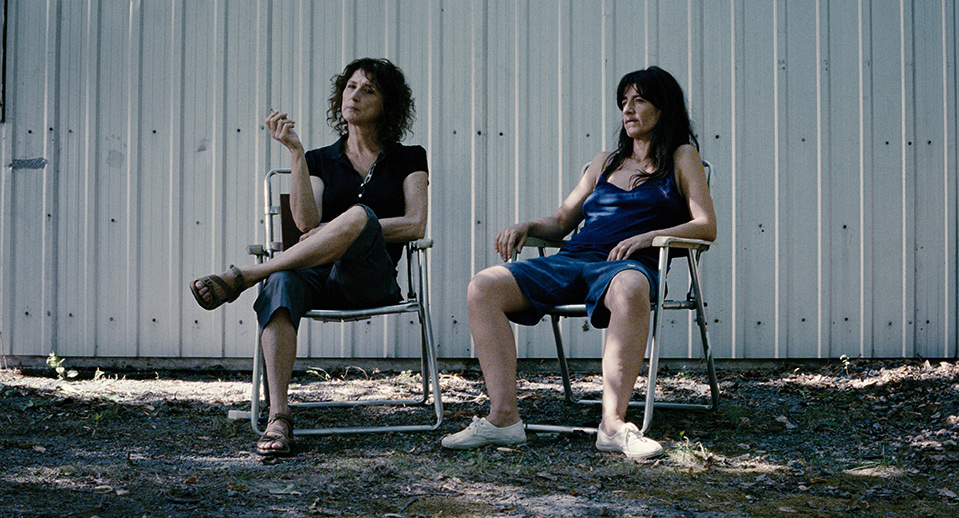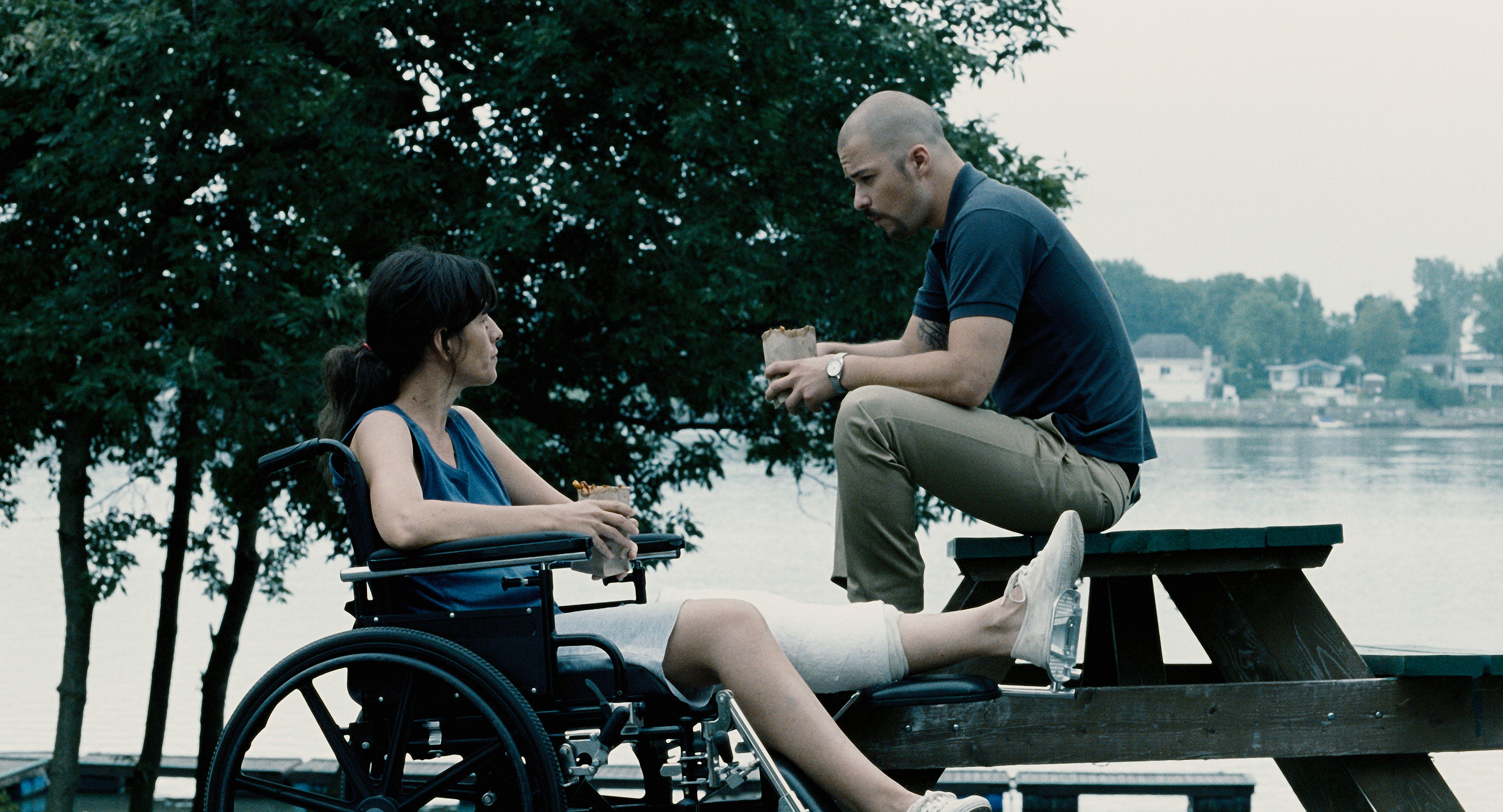
Scenes from the film Vic + Flo Saw a Bear
In Conversation with Denis Côté
The director breaks down his latest film: Vic + Flo Saw a Bear
From the title of Denis Côté’s latest film, Vic + Flo Saw A Bear, you’d be forgiven for expecting the latest pixar film. Or a wildlife documentary. Or the curious adventures of two women at Folsom St Fair. In fact, it’s the Berlin Film Festival award-winning story of two bizarre women who have just been released from prison and move into a cottage in rural Quebec. Vic craves isolation from everyone except her lover Flo, who increasingly grows restless and entertains herself with the town’s strange locals, including a handsome gay parole officer.
The film begins as a quaint meditation on people who sit on the fringes of society, and how even “true love” can ebb and flow based on necessity. Are these women lesbians, or were they straight women who found comfort in each other behind prison walls? Does it even matter? Denis Côté has created his own film language, and just when you’re settling into Vic + Flo’s offbeat dramatic rhythm, it swerves into an entirely different genre — the revenge thriller. We recently sat down with Côté in New York to discuss creating this unique story, gay audiences and taking his revenge on the film industry.
Vic + Flo Saw A Bear is very different from your previous films, including your last film Bestiaire — a zoo documentary. What inspired you to create this film? Well if you’ve seen most of my films, you can see there’s a big film with a $1m or $2m budget, and then I need to take my revenge over the industry. Like when I did Curling; I thought, “Ugh 25 people, 35 people, producer this, assistant that. I need to take my revenge. Let’s go in a zoo with 3 people and make Bestiaire.” I love making those films — no script, you don’t know what you’re doing. It sounds silly to say that but it makes you feel so alive. Then we released it in Sundance, Berlin, it was released in Germany…
It went beyond your expectations? 85 film festivals worldwide! So you feel so alive and so free.
And that lead to Vic + Flo… Yes I was ready for Vic + Flo, because I needed to direct actors, write dialogue, write a good script, and try to make something out of $2m. I’m not saying it’s my most favorite experience — it’s hard because I’ve never made TV, never made a video or commercials. And of course after this film I had to take my revenge, and I’ve just finished a much smaller film. But to be more serious, I wanted to write for women characters, which I haven’t done too much in my films. I’m always writing for men, who are not talking much… I wanted people to talk more, face-to-face and to have the chance to work with these actresses (Pierrette Robitaille and Romane Bohringer).
There are many representations of sexuality in the film, from Vic and Flo’s lesbian relationship to the gay parole officer. What were you hoping to achieve with this? I met a parole officer for women and I said “Tell me how it works in prison with women.” Afterwards she said, “You know what I like in your script? The gay issue isn’t there.” Women come to jail and within one week they need to be seen by other inmates with another woman, walking hand-in-hand. Those are security couples. It has nothing to do with being gay or not. And when they leave jail? She said, “Some women have been in jail with other women for 10 years so they just want to be with women. And some girls want to find men as soon as possible.” So she said the gay issue is not there, and that’s what I like in the film: we never talk about it, it’s just two human beings in love. And then I made sure the parole officer in the film is gay, just to close the door with Flo. So she won’t hit on him.
 Pierrette Robitaille and Romane Bohringer
Pierrette Robitaille and Romane Bohringer
 Romane Bohringer and Marc-Andre Grondin
Romane Bohringer and Marc-Andre Grondin
What has been the response from the gay and lesbian community? Well then I discovered even weirder things. In every festival they put it in the gay section. The gay audience comes to see the film and not everybody likes it. There’s always one angry lesbian. And I discovered a whole new theory: apparently it’s a cliche to kill the gay character at the end of a film. People would say, “Oh you totally work in that cliche that you must punish the gay character — make sure they’re falling sick or they’re dying.” But that was the first time I’d ever heard that theory. I got it in Istanbul — I got it in every country, there’s always one angry lesbian who doesn’t like the ending.
That really caught me by surprise. So the gay issues in the film are not inside me — I’ve never thought about it but it’s come back like this. The gay community is not angry at the film — some of them really love it because they’re like, “Finally! A film with gay characters that is not always trying to address the issues.” But then it’s not gay enough for a certain audience — they’re not beautiful enough, there’s no sex… It’s very weird.
How do you feel about it being slotted into the gay section in festivals? Does it limit the audience the film receives? I don’t understand the gay sections in festivals. Why do you pigeon-hole yourselves so that the gay audience will go to see the gay films in the gay section. Why do you create your own ghettos? I was just in the “Rainbow” section in Kiev…
Well I think in some ways it celebrates a particular community that is not well represented in film and media. At least not traditionally. The film has no social angle, no queer angle, it just is about gay characters. It’s actually funny, someone out in Ireland in a gay film festival in Cork wrote in the program “Please note that Vic and Flo don’t see an actual bear in the film.” I wrote to the guy and said “I’m just wondering about what you wrote—are you really serious? Telling the audience not to be disappointed because they don’t see a bear? Do you mean bear bear or bear ‘bear’? Was that humor or real?” And the guy said “I guess that was some kind of Irish humor and maybe I failed!” It was funny.
Tell us about the title — it almost sounds like a fairy tale but reveals itself to be something much darker by the end. Just the title Vic + Flo Saw a Bear — is that man or woman? Is it animals? They saw a bear? There’s a sense of menace. Is it an animation film? Is that a film for children? But that’s what I like… There are so many mood swings and shifts — I was terrified.
What was it like to then go on to win the 2013 Silver Bear at the Berlin Film Festival? I’m not an award guy but an award coming from the hands of Wong Kar-wai telling you it’s the most original film in the competition — it was a way to tell me, “Just stay yourself, and what you just tried we like…” That I told a very intimate story about two women and then BAM! — it goes into a vengeance story. Can you do that? Is it too random? I’m still asking myself that.
Did that come before the development of the story? Did you have that idea that you wanted to combine these genres in such an unexpected way? I have to admit, yes. Because I don’t think I’m really a good storyteller — I’m not really interested in entertainment. I’m really interested in how to construct and deconstruct narrative. This is my form, this is my language — I was a film critic so maybe I’m more cerebral and cold. I’m not a pessimist but I think everything’s been made in cinema and I cannot accept just writing a good story to entertain people. So I’m always attacking film language. When I get too comfortable I feel like I need to destroy something. I’m making one film a year and trying new things. I see my work as a big wall and every film is a little brick… It’s a conscious decision to always shake things up.
Tell me about writing the Marina character—was it as much fun to write as the actress (Marie Brassard) had playing it? She’s such a great character. I knew she would be super badass, but when she came on set… She’s a lunatic! And she was playing it so sweet — I was totally surprised what a cute little lady she was.
It’s a great element of the film, the way she develops. She became that ultimate badass. In Quebec cinema she is quite important because we don’t have a long history of bad guys in our films. We come from a very Catholic society and the bad guy has to be punished, or you never see his face, or he has no psychology. He’s just the bad guy. But I like the fact she has a face, she has a psychology, and she gets away with this trouble in the end. So I took my revenge on political correctness in that way.
Your style in this film has been compared to Wes Anderson and the Coen Brothers. Who are the directors working today you relate to or that inspire you? I decided to stop answering that question because after being a film critic people say, “Oh I can see his influences.” But you know after winning in Berlin and people saying Bestiaire and Vic + Flo are so different… I’m so proud that people look at my films and say “This is so Denis Côté.” So I just won’t name directors that I like anymore because I don’t want to seem like just a cinephile film critic. I always hear people compare me to Coen Brothers — no idea why. Because people saw snow in Curling? And Wes Anderson I have no idea where that comes from — I’m not even a fan. So I don’t know what to say anymore. But if I can get to the point where people say “That’s a Denis Cote film” — it means a lot…
Vic + Flo Saw A Bear opens on 7 February at the Anthology Film Archives in New York City.